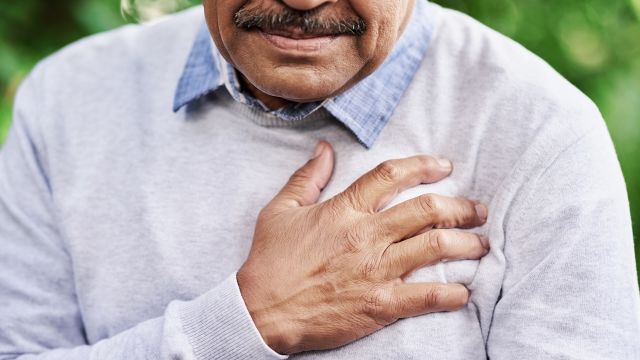Heart attacks are believed to come on suddenly with no warning. And while that is often the case, the disease that causes heart attacks is often years in the making. A heart attack, also known as a myocardial infarction, occurs when blockage in one or more coronary arteries surrounding the heart stops the flow of oxygen-rich blood to the heart. If the blockage isn’t quickly removed, the heart muscle begins to die. Every year approximately 735,000 Americans suffer a heart attack.
Here’s what you need to know.
Causes and risk factors
Coronary artery disease (CAD) is the most common cause of heart attacks. CAD is a buildup of fatty deposits, called plaque, in the arteries located on top of the heart muscle before entering the organ. The build-up of plaque over many years is called atherosclerosis. “Sometimes the plaque ruptures for reasons we don’t know and causes a blood clot,” says Muhammed Bhatti, MD, a cardiologist with Southern Hills Hospital and Medical Center in Las Vegas, Nevada.
The clot can partially or fully block the flow of blood in the artery, says Dr. Bhatti. A fully blocked artery causes more damage. “It’s the extent of the blockage that causes the danger,” he says. Less common causes of a heart attack include a spasm or tightening of the coronary arteries, cutting off blood flow or a spontaneous rupture (or dissection) of the artery.
You’re at increased risk for a heart attack if you smoke, have high blood pressure, have high cholesterol, are overweight, eat an unhealthy diet, are sedentary or have high blood sugar due to diabetes or prediabetes. Metabolic syndrome—a dangerous combination of abdominal fat, high blood pressure and high blood sugar—also increases your chance of a heart attack. Other factors include age—you’re more likely to have a heart attack if you’re a man over 45 or a woman over 55; a family history of heart attack; or if you’ve previously had one.
Symptoms
Chest pain is the most common symptom in both men and women, but women are likely to have other symptoms that are more difficult to diagnose, says Bhatti.
In addition to chest pain, common symptoms of a heart attack include:
- Dizziness
- Sweating
- Nausea
- Shortness of breath
- Rapid or irregular heart beat
- Indigestion
- Unusual fatigue
- Anxiety
About one in five heart attacks, so-called silent heart attacks, has no symptoms.
First response
If you think you’re having a heart attack, immediately call 911, says Bhatti. You may be instructed to chew one 325 mg aspirin. Aspirin can help dissolve the clot.
Do not drive yourself to the hospital or have someone else do so. “If you’re having a heart attack, there’s no blood flow and your heart is dying, which can cause rhythm problems,” says Bhatti. “If that happens when someone is driving you to the hospital, they can’t help you. If it happens in an ambulance, they’ll be able to see that on the monitor and can shock you out of that rhythm.”
Diagnosis
Once at the hospital an immediate electrocardiogram can help doctors determine the extent of the damage to the heart. Blood tests can check for proteins that are released into the blood stream when the muscle tissue of the heart dies. A coronary angiogram can show the inside of the coronary arteries to help find blockages.
Treatment and recovery
Immediate treatment usually consists of aspirin to help prevent new clots and nitrates to reduce the workload on the heart. Morphine may be given if you’re in extreme pain, and oxygen if you’re having trouble breathing. To open the blocked artery, you may need a stent, which is a metal tube that keeps the artery from closing, or a medication called a thrombolytic that breaks up the clot.
Some patients may need bypass surgery, which involves removing a vein or artery from another part of the body—usually the legs. Typically one end of the vein or artery is attached to the aorta, while the other is attached to the coronary artery past the blocked section, restoring blood flow.
You’ll probably be on medication once you’re released from the hospital. These medications often include aspirin or other anticoagulants or anticlotting medications to prevent more blood clots, ACE inhibitors to lower blood pressure, beta-blockers to decrease the strain on the heart and statins to control cholesterol and reduce inflammation.
Bhatti says the sooner the blood vessel can be opened, the better the outcome. “Any patient we suspect is having a heart attack, we try to open up the vessel within 90 minutes,” he says. “If the blood flow was restored and damage was minimal, the prognosis for recovery is excellent. Otherwise, if there’s too much damage, the patient may develop congestive heart failure.”
Prevention
The most important prevention piece is not smoking, according to Bhatti. “Cigarette smoke contains toxins that probably cause inflammation in blood vessels,” he says. “These toxins also cause the buildup of plaque.”
Other pieces of the prevention puzzle include taking any prescribed medication, regular exercise—Bhatti recommends 30 to 40 minutes of walking or biking per day—and a heart healthy diet. That means, “no processed foods, avoid refined sugars, refined carbs and fried foods,” says Bhatti.






